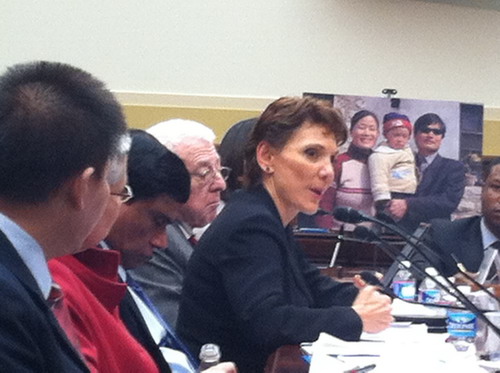Key members of Congress spoke at a Capitol Hill reception hosted Tuesday evening by Rep. Dana Rohrabacher to mark the 70th anniversary of Voice of America broadcasting to China and stressed the importance of VOA for the cause of media freedom and human rights.
Ileana Ros-Lehtinen, chairwoman of the House Foreign Affairs Committee, addressed VOA China Branch employees and several hundred guests, as did Congressman Chris Smith, a strong advocate for human rights victims in China. Congressman Smith came to the reception directly from conducting a hearing on the imprisonment of Liu Xiaobo who was awarded the 2010 Nobel Peace Prize for his long and non-violent struggle for fundamental human rights in China. Two members of the Committee for U.S. International Broadcasting (CUSIB), Reggie Littlejohn, president of Women’s Rights Without Frontiers, and Harry Wu, founder of the Laogai Research Foundation, testified at the hearing. CUSIB supports U.S. government-funded broadcasting to countries without free media. Several CUSIB members attended the reception.
The reception’s host, Congressman Rohrabacher, is credited with saving VOA radio and television programs to China from being terminated by the Broadcasting Board of Governors (BBG), the federal agency which manages VOA. Congressman Rohrabacher had introduced an amendment which received broad bipartisan support and blocked the BBG action. BBG executives wanted to terminate the broadcasts on October 1, the anniversary of the founding of communist China.
The BBG plan was met with strong opposition among human rights activists, both in China and in the U.S., as well as among Democrats and Republicans in Congress. One of those who opposed the plan was former BBG member Blanquita Cullum who spoke at the reception about the importance of radio broadcasts to China.
Current BBG members were invited to the reception but failed to show up. Also absent was VOA Director David Ensor. He was represented by VOA’s Executive Editor Steve Redisch. The BBG was represented by IBB Deputy Director Jeff Trimble who had advised BBG members on the failed plan to end VOA radio and TV broadcasting to China. Neither VOA nor BBG had issued a press release about the 70th anniversary reception on Capitol Hill.
The Capital Hill reception and the presence of high ranking members of Congress represented an unprecedented show of support for VOA radio and television broadcasting to China. Several CUSIB members told BBG Watch they hope this show of support will convince members of the Broadcasting Board of Governors of the need to question their executive staff’s strategy of eliminating VOA radio and TV broadcasts in favor of Internet-only news delivery — the medium in which the BBG has no advantage over numerous other news providers and which is heavily censored in China.
One observer told BBG Watch that this strategy has alienated the most important and probably the only constituency U.S. international broadcasting can count on to take its message for support to the American people: members of Congress and NGOs working to restore human rights in countries like China and Russia. “It’s a real tragedy that what is obvious to so many dedicated VOA China Branch broadcasters and their Congressional and other supporters seems so difficult to grasp by BBG executives,” a BBG Watch source said.
